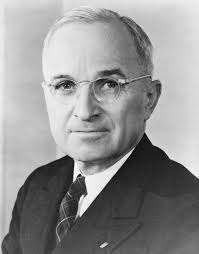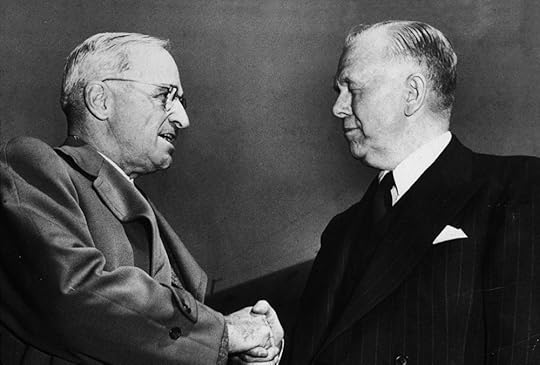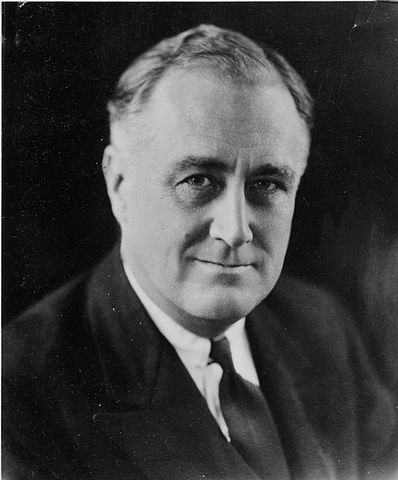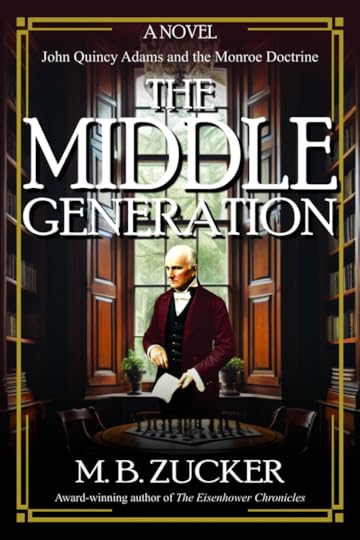M.B. Zucker's Blog, page 2
November 16, 2023
Top 10 Foreign Policy President, Number 5: Harry Truman
Few presidencies have been as uniformly dominated by foreign affairs as Truman’s but that’s expected when assuming office during history’s largest war and the birth of a new global order. He oversaw the final weeks of the European war and Nazi Germany’s surrender. He then became the only leader in world history to authorize the use of nuclear weapons in warfare, the main reason for Japan’s surrender. At the time, estimates for expected American casualties from invading Japan were around 30,000, but subsequent estimates have surpassed one million, plus over ten million Japanese. I’m not going to rehash the debate over dropping the bomb in this post, but I will say that I’m convinced Truman was more focused on defeating Japan than sending a message to Stalin, as some critics claim. The more interesting point is whether Truman knew the second bomb was going to be dropped on Nagasaki until after it happened. My reading suggests that he did not and that this was why he established the presidential monopoly on authorizing the use of nuclear weapons.

Woodrow Wilson articulated the Liberal World Order and FDR designed it but Truman implemented it. He established the United Nations in June 1945, committing the world to preventing anything like World War II and the Holocaust from ever happening again. The UN hasn’t always lived up to its founders’ hopes, but it remains the centerpiece of international liberalism and humanity’s quest for peace. He also insisted the top German and Japanese leaders be tried for the crimes, leading to the Nuremberg and Tokyo Tribunals. This established humanity’s definition of evil and modern international criminal law.
Truman’s policies toward Europe are one of the five greatest achievements of any President. He put former President Hoover in charge of distributing food across the continent in 1945, saving an estimated 100 million lives. Two years later, the Marshall Plan rebuilt Western Europe into an important democratic block and NATO bound it and the US into the world’s most important alliance.

Soviet domination of Eastern Europe and commitment to spreading communism led to Truman setting containment as the US’ main foreign policy goal under the Truman Doctrine. There are many critiques that could be made of how the US waged the Cold War, but ultimately, Truman’s framework saved the world from both Soviet world hegemony and World War III. He also supported Israel’s creation, helped push the 1947 partition plan through the UN, and made the US the first country to recognize Israel’s existence (overruling Secretary of State George Marshall’s advice). This is either good or bad depending on one’s views on that conflict.
With all of these accomplishments, you might wonder why he’s only number five on this list. Let’s look at some of his missteps.
Most historians don’t blame Truman for Mao’s victory in the Chinese Civil War, and that’s probably fair, though it should be noted that Eisenhower did think his mentor, George Marshall, bore some responsibility for suggesting Chiang Kai Shek bring some communists into his government. Either way, China’s fall expanded communism into East Asia and helped ignite the McCarthy era in America.
Truman was right to rescue South Korea from the North’s invasion with a UN coalition. Unfortunately he didn’t stop there, authorizing MacArthur to go north of the 38th Parallel and unify the Peninsula under the West’s influence. This provoked Chinese intervention, leading to a stalemate that cost 30,000 American lives only five years after vanquishing the Axis. Truman properly sacked MacArthur (and his own popularity) when the general publicly called for using nuclear weapons, but it was Truman’s initial authorization that led to the stalemate and his receiving the lowest approval rating in presidential history.
Worst of all was his approval of NSC 68, a document that predicted the Soviets would dominate Eurasia and strike the US with nuclear weapons by 1954 and set US defense spending to WWII levels on a permanent basis. Truman authorized the document after the Korean War began, quadrupling defense spending and increasing inflation. NSC 68 was the culmination of Truman’s foreign policy and it wasn't financially sustainable, meaning the US would have to either forfeit the Cold War or combat the Soviet Union by the end of the 1950s. I think this holds Truman back from the Rushmore of foreign policy Presidents, while the President who made containment a durable strategy remains higher on the list.
Forgotten Elements of FDR’s Foreign Policy Record
I am not an FDR hater. I rank him as one of the five best Presidents and like his foreign policy even more than his domestic. He was an excellent Commander-in-Chief during WWII and the Atlantic Charter and United Nations redefined international relations by making conquest a taboo. However, there are some parts of his record that get overlooked that complicate his legacy.

Most WWII buffs know that the US placed an oil embargo on Japan after Japan absorbed Indochina from Vichy France in autumn 1941 and that this was Japan’s prime motive for attacking Pearl Harbor. But how many know that the State Department made the move without FDR’s direction? FDR met Churchill in August off the coast of Newfoundland to introduce the Atlantic Charter and in his absence Assistant Secretary of State Dean Acheson severed Japan’s ability to purchase US oil. FDR was stunned and knew the move was provocative but 51% of Americans approved of it and so he left in place.
Emperor Hirohito gave Prime Minister Konoye one month to reach a deal with Washington. Konoye secretly met with the American ambassador and proposed he meet with FDR in Hawaii to establish the framework for a deal. This was sent to the State Department, which convinced FDR that meeting Konoye without a deal in place beforehand would be seen as another Munich Agreement. FDR agreed and sent conditions Konoye had to fulfill before the meeting, which included Japan’s withdrawal from the Tripartite Pact and from its war in China. Konoye had no way of fulfilling these terms and resigned as Prime Minister. He was replaced by Hideki Tojo.
Acknowledging this diplomatic blunder is not engaging in the conspiracy theory that FDR was responsible for December 7, but it is a large piece of his foreign policy record that is almost never mentioned even by professional historians (I learned of it in Jean Edward Smith’s FDR biography). It’s probably one of the largest foreign policy blunders in presidential history, even if, in the long run, the world is better off without the Japanese Empire. Let’s discuss two more.
The Lend Lease Act was arguably FDR’s greatest contribution to Allied victory. Some have even cited it as proof that he “saved the world.” This argument has merit, for it transformed the US into the Arsenal of Democracy and helped fund the British, Soviet, and Chinese war efforts. But FDR also used it to influence his postwar priorities. His seemingly innate trust in the USSR, which he saw as a progressive state, and suspicion of Britain (given his dislike for colonialism), was perhaps his worst miscalculation. He gave Britain the bare minimum it needed to fight the war, aiming to bankrupt London so it couldn’t hold onto its empire. Simultaneously, he gave Stalin a blank check, strengthening the Soviet position in the early Cold War. We can see the legacy of this decision today, not only in the Russo-Ukraine War, but in the rushed partitions of Israel-Palestine and India-Pakistan that resulted in entrenched conflict lasting over 75 years. I write this about a month after Hamas’ attack on October 7.
The following documentary details FDR’s strategy for bankrupting Britain:
https://youtu.be/aoqV-EuYEOQ?si=pTcVe...
The final episode I want to highlight occurred in the November 1943 Tehran Conference. Churchill wanted to detach Prussia from Germany by moving it into Poland and proposed moving Poland’s border to the Oder and Neisse rivers. Put more simply, he said the Allies should move Poland westward at Germany’s expense and to the USSR’s gain. Stalin agreed and so did FDR, who only asked that the move not happen until after the 1944 election so he did not lose the Polish vote. This agreement led to Stalin forcefully moving 10 million Germans and millions of Poles between 1945 and 1950, an ethnic cleansing that killed at least half-a-million people. He did it with FDR’s blessing.
FDR is one of America’s best Presidents for leading the nation through the Great Depression and World War II, two existential crises. He renegotiated our social contract and designed the Liberal World Order. But other Presidents’ failings are routinely used as proof of their deficiencies (think of Ike’s use of covert operations or Reagan and Iran-Contra). Yet these low points of FDR’s record are barely known to most people. Taking them into account offers a more checkered view of one of democracy’s great leaders.
November 10, 2023
Top 10 Foreign Policy President, Number 6: Ronald Reagan
Reagan’s fans frame him as the architect of America’s victory in the Cold War. I would give such an accolade to those who designed containment, such as Truman, Kennan, Marshall, and Ike, but I do think Reagan deserves a lot of credit for the Cold War ending when it did.
He escalated the arms race with the Soviet Union, which it could not afford. He also instructed the CIA to shut down the importation of Western technology into the USSR, strangling their economic growth and forcing them to the negotiating table under Gorbachev. His Strategic Defense Initiative, although fanciful, was taken seriously in Moscow, leading the Soviets to believe that they could not resist American technological superiority. Reagan’s refusal to surrender SDI led to his failure in eliminating all nuclear weapons but did succeed in eliminating the Intermediate Nuclear Force (INF), which had held Europe in a balance of terror for decades. It was the first major reduction of nuclear weapons, leading to further dismantlement by successive presidents.

He called the Soviets an “Evil Empire” in 1983. This may have been hawkish, but it also empowered Eastern Europeans behind the Iron Curtain to oppose communist tyranny. He also pushed for greater human rights within the Soviet Union, highlighting that dimension of the authoritarian regime’s brutality after Nixon’s cold pragmatism.
Reagan’s critics will point to his failures, like placing marines in Lebanon as part of a UN peacekeeping force and withdrawing them after Hezbollah bombed their barracks. They’ll mention the Iran-Contra Affair, a scandal rivaling Watergate and relatedly, American support for murderous right wing factions in Central America. These are legitimate criticisms, but Reagan still deserves credit for the fact that in 1980 the Soviet Union had the upper-hand and by 1990 it was on the brink of collapse. Having Gorbachev, and not Khrushchev or Putin, as his Soviet counterpart helped, but Reagan’s policies fostered the conditions for that historic victory for liberal democracy and world peace.
November 2, 2023
Top 10 Foreign Policy Presidents, Number 7: Richard Nixon
Nixon believed the Grand Design, his name for the strategy of playing China and the Soviet Union off of one another, would one day overshadow the Watergate scandal and his resignation. That has yet to happen, but his great power diplomacy is often treated as a gold standard for modern American foreign policy. President Obama once downplayed expectations of his own foreign policy by saying that Nixon’s opening to China was a one-in-a-generation type of accomplishment. Historian H. W. Brands said that Nixon’s foreign policy was one of the three most important diplomatic events of the twenty century, the other two being the World Wars. Nixon wanted to be remembered as a giant on the world stage, like his heroes: Disraeli, Wilson, the Roosevelts, Churchill, and de Gaulle. He advanced world peace largely because he wanted it as his legacy.

(image by Britannica)
The Grand Design is not without criticism. China has become the second largest economy and arguably the world’s greatest threat to liberal democracy. Its access to the global market is also partly responsible for the Covid 19 pandemic. Nixon’s detente with the Soviet Union has been blamed for the Soviets gaining nuclear parity and for America’s inaction as they gained covert momentum across the Third World in the 1970s.
Then there’s the Vietnam War. Nixon inherited the situation from Johnson, including half-a-million soldiers in Vietnam and large social protests domestically. Nixon tried to disrupt Johnson’s peace negotiations in 1968 in part because he wanted to keep the war alive as a campaign issue, and although the negotiations likely broke down from independent causes, his action remains highly immoral. It took Nixon four years to broker an armistice and while it took all of his efforts, including heavy bombings and the Grand Design, to force Hanoi’s hand, Nixon’s Oval Office tapes also imply that he did not want to risk South Vietnam’s collapse until after his 1972 reelection.
There are several other controversies I could discuss, from Pakistan to Chile to Cambodia, but I’m trying to keep these posts short and so I’ll summarize my thoughts as simultaneously bothered by Nixon’s ruthlessness but still appreciative of his efforts to enhance global stability by exploiting the Sino-Soviet Split and constructing a trilateral balance of power between America, China, and the Soviet Union. Doing so required greater vision than most Presidents possess and for this I think Nixon deserves a spot on this list.
Rewatching Schindler’s List after 10/7
Few films have grown on me as much as Schindler’s List. Like everyone, I acknowledged its power. It is considered one of the hardest films to watch and most people say they will only watch it once. I just watched it for the fourth time in two years and in that time I went from thinking it inferior to Saving Private Ryan to considering it Spielberg’s magnum opus and one of my five favorite films of all time.

(image from IndieWire)
Spielberg has said that Lawrence of Arabia is his favorite film (a fact I share with him, as well as having both grown up in Phoenix and sharing interests in sharks, dinosaurs, and WWII) and I suspect he set out to become David Lean’s heir and intended Schindler’s List, which portrayed the most important topic of his life, to be his Lawrence. He succeeded. Schindler lacks Lawrence’s character depth (though that’s also true of all other films). Instead, its portrayal of the Holocaust is its defining quality. Schindler’s remarkable story is its vessel.
Schindler’s List contains perhaps the greatest thematic message in all of historical fiction (rivaled only by War and Peace). Kubrick supposedly said that the film wasn’t about the Holocaust because it was about Jews who survived, but Spielberg subverts the Holocaust by telling the true story of a German who sacrificed everything to save 1200 Jews. Spielberg thereby proved that morality survived the Holocaust and the Nazis lost the battle for humanity’s soul. What message could be more important?
I paid greater attention to the film’s pacing during my most recent viewing. It is made up of shorter and faster-moving scenes than most films and with a greater number of them, allowing it to cover more ground. This is needed given the large number of characters the film follows, most of them Krakow Jews trying to survive. Perhaps a future post will discuss the range of pacing styles within the biographical fiction genre. I’d put Schindler’s List closer to Oppenheimer’s three hour trailer pacing than Lawrence’s slow burn.
One final thought about this masterpiece: the girl in the red coat (who was real and survived the war, contrary to the film’s portrayal) is the most famous image, but the entire Liquidation of the Krakow Ghetto sequence is every bit the equal of the Omaha Beach scene in Saving Private Ryan in both its violence and power. Spielberg shall remain a lifelong inspiration to me, both for these epics and for many others.
October 25, 2023
Top 10 Foreign Policy Presidents, Number 8: Theodore Roosevelt
The history of American foreign policy can be divided between pre- and post-1898, meaning before and after the Spanish-American War. Roosevelt was one of the leading advocates for war with Spain after the USS Maine exploded, even though it was suspected to be an accident even at the time. He famously led the Rough Riders up Kettle (not San Juan) hill, becoming the biggest hero to emerge from the war. This not only helped Roosevelt’s political career but, in his mind, redeemed his family after his father abstained from fighting in the Civil War.

(Roosvelt's Big Stick Foreshadowed Ike's New Look)
Roosevelt became President after McKinley’s assassination and his foreign policy is credited with establishing America as a world power. He backed Panamanian independence from Colombia when the latter rejected America’s offer to build a canal to connect the Atlantic and Pacific Oceans. Roosevelt became the first President to leave the country while in office to oversee the canal’s construction. The canal was part of his larger scheme to transform America’s navy into one of the greatest on Earth. The Navy became his famous “big stick,” allowing America to project its power abroad.
Bismarck unified Germany in 1870, destabilizing the relative peace in Europe that Metternich designed at the Congress of Vienna. Roosevelt defused two conflicts which could have ruptured the European system and brought World War I almost a decade early. The Russo-Japanese War was the more famous of the two and brokering its end won Roosevelt the Nobel Peace Prize. Britain and Germany were each contemplating interventing for their respective allies (Britain was allied with Japan and Germany was allied with Russia), meaning Roosevelt halted the conflict before it reached global proportions.
The other crisis occurred in 1902, when Germany sought to force Venezuela to pay its debt as a pretext for colonialism. Roosevelt sent a fleet to encounter the Germans off of Venezuela’s coast. He told the German ambassador that the Kaiser had ten days to back down before he would ask Congress to declare war. The Kaiser did. Roosevelt handled the crisis so quietly and skillfully that it remained little known until the 1970s, by which time, the similar and noisier Cuban Missile Crisis had passed.
October 19, 2023
Top 10 Foreign Policy Presidents, Number 9: Thomas Jefferson
Jefferson was America’s philosopher-president. As the main author of the Declaration of Independence and Virginia Statute of Religious Freedom, many at the time saw Jefferson as both a dreamer and a radical and feared his election (which he termed the Revolution of 1800) would bring the sort of Jacobinism that he endorsed in France to America. Jefferson pivoted to the center while in the Executive Mansion and proved himself arguably the finest political operator within the young republic.

The Louisiana Purchase was his signature achievement. Napoleon put his brother in charge of Spain, which ceded the Louisiana Territory to France. Jefferson’s Francophilia showed its ceiling when he grasped the limited appeal of having modern history’s greatest conqueror placing his empire on America’s flank. Jefferson sent James Monroe to Paris to negotiate New Orleans’ sale. The Haitian Revolution removed France’s primary access point to North America and so Napoleon instructed Talleyrand, his foreign minister, to sell all of Louisiana to America for $15 million. This news arrived in Washington City on July 4, 1803. The Constitution doesn’t say anything about buying new territory but Jefferson placed his strict constitutionalism aside and pushed the deal through Congress before Napoleon could change his mind. The result doubled America’s size and was a critical step toward the country’s rise on the world stage.
Jefferson is frequently (and rightfully) called a hypocrite for owning slaves and having a non consensual affair with Sally Hemings while writing that “all men are created equal” but this should not obscure his role in undermining two slave trades. The Constitution did not allow the government to discuss withdrawing from the Atlantic Slave trade until 1808, which became Jefferson’s last year in office. He seized his chance and had Congress ban the future importation of slaves (unfortunately, this increased the value of slaves domestically, leading to increased sales and familial separations). The other trade was in North Africa. Jefferson refused to pay the Barbary Pirates’ bribe, leading to their attacks on American ships and their enslavement of our sailors. Jefferson blockaded Tripoli and attempted a coup. The American flag was raised in the Old World for the first time and the Marines gained a line in their march (“to the shores of Tripoli”).
The French Revolution and Napoleonic Wars dominated the foreign policies of our first four Presidents and although this conflict led to Jefferson’s greatest achievement it also led to his greatest failure. Jefferson had Congress pass the Embargo Act in December 1807, ending American trade with the world. He hoped this would gain leverage to stop British and French attacks on America’s shipping but instead it caused one of America’s early recessions and Jefferson’s presidency to end on a bad note. He left office an aged man, unable to resolve the crisis that would become the War of 1812 under James Madison.
October 18, 2023
"The Middle Generation" is available for preorder
Exciting news!
My fourth novel, "The Middle Generation: A Novel of John Quincy Adams and the Monroe Doctrine" is now available for preorder!
This historical fiction novel is a political thriller about Adams' time as Secretary of State and his forgotten showdown with Europe over South American independence that led to the Monroe Doctrine. It also touches on the rise of slavery as a major national issue and the familial pressure of being an Adams.
Preorder sales are critical for a book to hit the ground running on Amazon, and I truly appreciate anyone who buys a copy. The novel releases on November 7.

Ebook: https://www.amazon.com/Middle-Generation-Quincy-Monroe-Doctrine-ebook/dp/B0CKY9DKW3
Paperback: https://www.amazon.com/Middle-Generation-Quincy-Monroe-Doctrine/dp/1962465063
Hardcover: https://www.amazon.com/Middle-Generation-Quincy-Monroe-Doctrine/dp/1962465055
One other item: I will be participating in the Southern Festival of Books in Nashville this Saturday and Sunday (October 21 and 22)! I’ll be in Booth 31 signing my books, including “The Middle Generation.” Come on out if you’re in the area!



